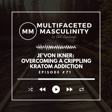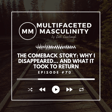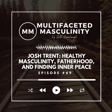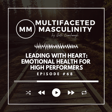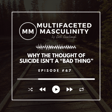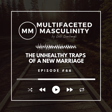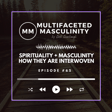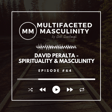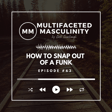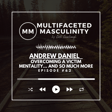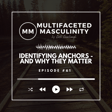Become a Creator today!Start creating today - Share your story with the world!
Start for free
00:00:00
00:00:01

How to Fully Let Go of a Toxic Relationship | Ep #52
Distance can help you gain clarity for dysfunction but only when you close out that old relationship in a complete and healthy way.
Today’s episode is a powerful tool I’ve used with clients to help them fully end a relationship and be able to move forward in life. It also helps keep you from recreating the unhealthy dynamics you hated so much in your old relationship.
In this episode you'll learn:
- 5 steps you can walk yourself through to gain clarity and move on.
- Why you need to find gratitude for your old relationship… no matter how painful it was.
- Ways you can use your old relationship to take ownership and grow as a person.
- The single action you can take to FULLY end the relationship in your heart.
Host: Josh Cearbaugh
Transcript
Introduction & Episode Intent
00:00:01
Speaker
Today's podcast is actually gonna be a little bit different than a lot of the ones that you've been listening to, especially recently, where we've had guests or co-hosts, et cetera. Today, I'm gonna be breaking down a homework that I've actually used with a lot of clients over the years.
00:00:18
Speaker
that's helped them detangle and uncouple from an unhealthy relationship, whatever that may be, a girlfriend, boyfriend, husband, wife. You could have dated somebody for a month or been married for 15 years.
Emotional Transition & Engagement
00:00:33
Speaker
The question is, how do you transition out of that relationship from an emotional standpoint? And there's a couple really practical things that you can do that if you engage with them and really let your heart go there in the process,
00:00:47
Speaker
that you can find yourself decoupling and finding clarity and able to actually move forward. So if you haven't already, please go ahead and subscribe to make sure you don't miss any episodes in the future. Always asking for feedback and reviews, not so much for me as much as it is for hearing from you for ideas for future episodes as well as
00:01:10
Speaker
Other people, you know, the comments that I get, it empowers other people to begin to pursue this inner world that we all have and navigating it and learning how to tap into healthy masculinity. So without further ado, let's dive into how do you decouple emotionally from an unhealthy relationship?
00:01:31
Speaker
Men, we are not simple, chest-thumping, rock-smashing, fire-starting barbarians. We have depth. We intensely feel. We are scared, yet brave. We love to have fun. We're imperfect and make mistakes. We're compassionate and loving. We are multifaceted. Let's explore the reality of masculinity together.
Understanding Emotional Connections
00:01:59
Speaker
All right, so today I am actually really looking forward to today's episode just because I know how effective this tool is. But before we dive into the actual steps on how to do what we're going to be breaking out, I want to lay a little bit of a foundation first. And that is that whenever you get into a relationship, it doesn't matter how long you've been in that relationship, you begin to create emotional connections, emotional bonds.
00:02:28
Speaker
Whether that be through opening your heart based on trust that's built, or if you have shared experiences, whether that's related to plant medicine, as I've talked about several times, or even just going on a trip, those shared experiences.
00:02:42
Speaker
the bottom line is when you do life with someone, you create connections. And so the question is, especially if you found yourself in an unhealthy relationship, I think it pertains to any, but if you actually end the relationship in a healthy way, this may not pertain to you quite as much. But if you were in an emotionally abusive relationship or physically abusive, or if the person you were in relationship with was a narcissist or gas lit you, whatever it may be,
00:03:12
Speaker
Those hooks, for a lack of better word, are still in your heart based on those connections that you create
Emotional Detangling Exercise Introduction
00:03:19
Speaker
with them. And so today we're going to be diving into an exercise that you can use to unhook
00:03:27
Speaker
those connections or to detangle. I call it the emotional detangling exercise. And that's because that's really what it does. And the important thing within it is it's identifying and expressing the reality of the emotional, physical, sexual pain that you experienced, but also taking radical ownership and then transitioning into gratitude and emotionally releasing them
00:03:54
Speaker
in really tangible practical ways and so it doesn't mean especially if you have had kids with that person doesn't mean they just disappear from your life but the goal of this exercise is to unravel those strands that may be connected between the two of you and ultimately to help you
00:04:13
Speaker
feel empowered and to move forward in life. So it's setting you up for success, whether you end up in another relationship or not, it's setting you up for success in the sense of helping you transition into actually letting go of them from an emotional standpoint.
00:04:32
Speaker
Now, a couple things with this is one, I'm a massive proponent of journaling for a variety of reasons.
Journaling & Emotional Processing
00:04:40
Speaker
I should probably do a podcast episode just on why journaling matters. But I would highly recommend, especially with the final steps of this, that you physically write it out. Some people, they are able to process better if they type things out. That's great. You can type it out and then print it if you want to.
00:05:00
Speaker
But you'll see at the very end, you actually need something physical to use, a piece of paper to use for some of the final steps. Again, I'm a big proponent of writing it out because it slows you down and you really want to let your heart explore these different areas. And so what we're going to do is just kind of break down these five steps and at the end,
00:05:25
Speaker
I'd love to hear from you if you do this exercise. How does it impact you? I've had clients that literally do this exercise and the very last step that they do, they are weeping and sobbing because of just the energy that they let go of. There's that lighter burden off of their chest and off their heart because they've actually gone through and let go of that entanglement that they have.
00:05:51
Speaker
So for, for first step. So for the first step, if I could talk this morning, uh, for the first step is it's important to write out your pain, to be brutally honest with the reality of the pain that you experienced in that relationship. Now, if you know me.
00:06:10
Speaker
I am not someone who is all about the empowered victim, right? So you're not going to stay at any one of these stages. You're going to be moving through step by step in order, but you have to start with being honest with what you experienced within that relationship. How did it hold you back?
00:06:32
Speaker
How did it emasculate you or suppress your voice? Was it that there was areas that there was lack or things that were insufficient or the person said or did things that were hurtful to you? Was that relationship emotionally tormenting? Was it manipulative? Was it controlling?
00:06:52
Speaker
you need to actually be willing to write out and communicate the reality of what you experience. Because if you don't do that, if you just move on and say, you know what, I forgive them and they put me through hell, but I forgive them and I am moving on.
00:07:10
Speaker
you're not actually regaining your strength or reconnecting to your voice. And part of that is being willing to acknowledge the reality of the hell, the negative side of things that you were in within that relationship. And a lot of people
00:07:29
Speaker
They pendulum swing one of two ways within this first step. It's either they do the, you know, you were taught, if you hurt somebody, you apologize, you forgive them, and then you move on. Or, you know, if somebody hurts you, they say, I'm sorry right away. This happens all the time with kids, right? If they trip a kid, then they say, what do you say? I'm sorry.
00:07:48
Speaker
And then the other person's obligated to go, I forgive you, and then you move on. I think there's value in that and not getting stuck in holding a grudge with someone. But what that can translate to as an adult is just moving through and moving beyond the pain, the significance of the pain that you experience. It's important to pause.
00:08:12
Speaker
And to feel that, and you may feel angry, you may feel violated, you may feel hurt. And a lot of us don't want to feel those emotions. And so what we do is we use, I forgive you, or we just move on or suppress as a means of not going there, of not acknowledging the reality of it.
00:08:34
Speaker
And so for that first step, you're giving yourself a window to look at what was the reality of the pain that you experienced and to write it out. And to write, you're essentially writing a letter to this individual.
00:08:48
Speaker
You're also going to be writing a letter to yourself as well, but you're writing a letter to this individual saying, you know what? You, I had these dreams and every time I tried to step towards those dreams, you cut me off at the pass. You belittle me. You, you tormented me. You, you held me back instead of champion me and moved me forward. How could you do that? I felt so robbed for those 15 years that we were together.
00:09:17
Speaker
And all I wanted to do was pursue my dreams. And I was scared as hell of it, but every step I took, I wasn't only scared, but I was pushed back by you from that because of your fears. And you just let loose. I've had clients that have done this all on the entire thing on one sheet. And I've had others that have done it in an 18 page, double-sided form. It's whatever is in your heart to let that out. And step one,
00:09:43
Speaker
is to write out your pain. Now again, I'm not about becoming a victim or staying in victim mode. So once you're done with that first step and you feel like you've flushed that out fully, the next step, it's time for you to take ownership.
Taking Responsibility & Finding Gratitude
00:10:05
Speaker
This is where you actually have to look at the reality that you
00:10:11
Speaker
created the radical responsibility for your part in the dysfunction of that relationship. Even if somebody was manipulative and narcissistic and controlled you, you let that happen. You stayed in that relationship.
00:10:29
Speaker
You probably out of pain, yes, but you reacted in certain ways, or you fought for control in your own way, or you lied, or slid around the corners, or played small in order to try to get what you want.
00:10:46
Speaker
whatever it may be within that relationship, it's time for you to take radical ownership because what this does is it's not about them. This part, step two, it's not about them. It's all about you because the reality is that relationship is over. And so for you to actually grow and find the relationship that you want, that you dream of, that you desire,
00:11:12
Speaker
The only way that's going to happen is if you start by taking radical responsibility for the part that was unhealthy that you contributed to. Otherwise, if you don't pause and take ownership and really start to look at how did you play a role in the dysfunction of that relationship,
00:11:30
Speaker
The people that don't do step two, they're the people that just recreate that same dynamic in a new relationship, right? They're the people that actually stay trapped in this victimhood where it's so easy, especially if someone's wronged you to just point the finger at them. But how, why is it that that happened? How did that happen? How did you let that happen for however long it was?
00:11:54
Speaker
What hurtful things did you say that maybe you regret or you wouldn't say if you weren't in pain? Again, it doesn't matter if they yelled at you and called you ugly and stupid and whatever. If you took the bait of that and you engaged in that, it's time for you to actually acknowledge the areas that you have to take responsibility and take ownership. In what ways did you fail to show up?
00:12:22
Speaker
I know that in my previous marriage, there was a lot of unhealthy dynamics within our relationship, but truth be told, some of that was on me, right? Some of that was some of her pain that out of her pain, she expressed things or did things.
00:12:42
Speaker
Well, that was a byproduct of me not actually showing up in my strength. Of me actually, of me not, of essentially failing to be a safe person for her. She didn't trust me. She didn't feel safe with me because, yes, it was because of both of us.
00:13:02
Speaker
But I took the bait. I reacted to things. I was not staying grounded in my strength. I was not moving into my inner king, what I was called to. I was letting fear and pain control and dictate my actions, which caused financial and emotional hardship for our marriage at the time.
00:13:26
Speaker
If I don't look at those things, I never have the chance to actually take ownership and to heal. And then I just recreate the same thing. That doesn't mean I don't have fear or don't have bad moments or I don't, or I fail to stay grounded at times. I'm human, right? But in my new relationship with my partner,
00:13:48
Speaker
I'm showing up and part of the reason why I'm able to do that is because I started by taking ownership and being radically responsible for the ways that I fell short because I didn't want to be that same person anymore in my next relationship. Hopefully that makes sense. So step one is to write out your pain, to acknowledge the hurtful and hard things, but step two,
00:14:14
Speaker
it's time for you to actually take a hard look at your role in that. Because otherwise you're setting yourself up for just recreating the unhealthy cycles. But you don't want to just stay there. And this step, this next step, it's been talked about in nauseam from, you can name the individual who is popular or who is motivational or encouraging or challenging, and more than likely they've brought up this next step. And there's a reason for it. And that is,
00:14:44
Speaker
gratitude. And especially if you were in a really hurtful relationship, this one can be kind of hard to tap into you could say, you know, there's nothing I can be grateful for. That motherfucker was a piece of shit. And I, I refuse to see any good in him. He was just an evil hurtful person, or she was just manipulative and controlling.
00:15:10
Speaker
But if you don't pause to actually connect to gratitude for them, what you're doing is you're laying, you're essentially planting the seed in really ripe soil for your heart to become bitter. And especially if that person
00:15:29
Speaker
was hurtful or harmful to you, if you land in a place of an emotional bitterness, really they win. It's been shown that there's a direct correlation between certain diseases and harboring bitterness or anger or resentment towards people and individuals.
00:15:50
Speaker
And so you can see it as an exercise of more so for yourself. Again, this is for you to detangle from that unhealthy relationship and to make that clean pivot. You know, I'll never forget one thing that I, well, actually I'll save this little note for the step four.
00:16:09
Speaker
But with gratitude, you know, you have to be willing to find gratitude where it may be hard to be found. And sometimes the hardest place to find it is in a relationship that was really hurtful. But I guarantee you that it's there.
00:16:27
Speaker
Right. You, you can, if you are willing, you have free will, if you choose to acknowledge and connect to gratitude for that person and, or for that relationship. And you may say, you know what, Josh, that relationship, there was nothing good that came from it. Well.
00:16:45
Speaker
you could actually argue that there was because for some people, they're grateful for really shitty upbringings and their parents were really hard on them and abusive. And you could say, well, how, why would you be grateful? Well, because that hard environment actually created a resilience in the individual that sometimes is hard to find if you don't have that harder upbringing.
00:17:12
Speaker
So that's just one quick example of how you can find gratitude where it may seem like nothing good came from it.
00:17:21
Speaker
But just some practical examples from a relational standpoint, you can start by writing out the ways that you're thankful for the positive impact that they made on the life that you had together or on you. Again, going back to my previous marriage, was there unhealthy aspects? Were we at odds? Were we energetically and emotionally mismatched in a lot of ways? Yes to all of that.
00:17:48
Speaker
We also moved across the country several times doing different things and started different businesses. And I grew as a man. Did I have insecurities and unresolved trauma and all of that? Yeah, I did. But I also grew
00:18:03
Speaker
And part of that growth came because I was in a relationship with her. And so there was positive aspects of that or for the good memories that you shared. You know, I don't know anybody who gets into a relationship and never has a positive memory and stays in that relationship.
00:18:23
Speaker
Now, obviously there are some exceptions with like extreme abuse and sex trafficking. I mean, there are the extremes. I'm not talking about the extremes. I'm talking about just a general everyday person who gets into a relationship, who finds that they're in an unhealthy one and then breaks free from it.
00:18:38
Speaker
It could be that time I went to the Grand Canyon with you in 2015, you got to see the Grand Canyon. Maybe did you argue in the car on the way there and things like that? Yeah, but there was positive memories that you had. And so write out those positive memories. What are you grateful that you experienced as a by-product of being in that relationship?
00:19:00
Speaker
or it could be even, you know what? Thank you for the way that you overreacted or had this outburst towards the end of our relationship because that brought me to my tipping point and realizing that we shouldn't be together.
00:19:15
Speaker
It could be actually what's perceived as a really negative experience, but you can pivot that to gratitude and say, thank you, that you made it miserable enough for me that I had to get out because now I'm on the other side of it.
00:19:31
Speaker
And, and would that have happened if you not acted the way that you'd acted that you'll never know. Or thank you for challenging me in this way. You know, while you were in the relationship, did you sober up or get a new job or move to a new city? And, and part of the, your decision to do those things came from your partner challenging you.
00:19:51
Speaker
in certain conversations or by being in relationship with them. Or maybe they were more health conscious than you. The list can go on and on and on in the ways that you can find gratitude for that relationship. So step one, write out your pain. Step two, take radical ownership.
00:20:10
Speaker
Step three is connect to gratitude. And let me actually pause here and say, this may take you a few weeks to do. This is not necessarily just, okay, I'm going to sit down for 15 minutes before the kids wake up. And I'm going to write this in my journal and do this really quick.
00:20:28
Speaker
If you actually want to untangle and detangle the emotional aspects that were interwoven in your heart and move on and move beyond, you really need to do yourself the justice of sitting with each one of these steps until your heart feels at peace and like you've really flushed it out.
00:20:53
Speaker
Now step four, step four is where really the transition goes or begins to go and that is it's time to release.
Letting Go with Compassion
00:21:05
Speaker
So after you've acknowledged the pain and the suffering and you've taken that radical ownership and you have connected to gratitude for what you had.
00:21:14
Speaker
If the relationship's actually over, it's time for you to release that individual. I know several people that they, they essentially stay trapped in their past.
00:21:25
Speaker
They say trapped in the fantasy or the facade of what could have been, or you get almost stuck in those positive memories or positive moments, but not realizing the reality of the relationship that you were in. And that's because they haven't actually gone through the process of releasing that person from their heart.
00:21:47
Speaker
And this is where you let go. You, you know, for me, I actually had a really powerful moment when I was doing a self journey with MDMA with my ex wife where I sat her down and I had done this exercise, but I, when I was on, on, on MDMA.
00:22:07
Speaker
I sat her down in front of me. She wasn't there physically, but just kind of emotionally. And I went through this beautiful process of releasing and letting go of her. I hadn't really done that. And the thing was, I was already starting another relationship. This was a couple years later with somebody else.
00:22:24
Speaker
And I was kind of wrestling with, well, is she the right person for me, this new girl that had come into my life? And because I hadn't really fully released my ex-wife from my heart. And so I was stuck. There were certain strands that were still stuck there because I hadn't gone through this process.
00:22:42
Speaker
And this is where you let go. This is, this is probably where you want to take the most time out of any of these steps to make sure that you really adequately emotionally release and.
00:22:55
Speaker
With every word you write, you want it to carry tangible weight. What do you wish for that person moving forward? Or in what ways do they no longer have access to your heart? You let yourself go to these places where it's, going back to what I said earlier where I'll never forget, I was standing in my ex-wife's store
00:23:25
Speaker
when we had finally reached the point of no return per se. And I remember I was crying, I cried a whole lot during that whole process, but I was crying and I said to her, I'm really sorry that you couldn't find the love that you were looking for in our marriage. And I genuinely hope that you find the love that you're looking for with someone else.
00:23:50
Speaker
And that was so hard for me to express and communicate, but I meant it. I meant it because we're no longer in relationship. And it goes back to that whole piece of bitterness and resentment. I want her to find love and to be happy. You can choose, say, you know what, that person hurt me, screw them. I hope they get screwed over a hundred times over. You're only hurting yourself by having that posture in your heart.
00:24:19
Speaker
When you let go of that person, you wanna let go of them with love, with compassion, with gratitude, because that is actually the thing that's gonna help you move beyond that relationship and fully release, because when you get locked into bitterness, resentment, then you're still looking back, it's like, okay, when's that person gonna get screwed? Oh, well, they're in this relationship, I can't wait until so-and-so cheats on them so they feel what I feel.
00:24:47
Speaker
And really all they're doing is they're still holding space in your heart because you haven't let go. And so part of this letting go.
00:24:56
Speaker
is being willing to let go in love, to let go in compassion. And just a couple of prompts, you know, I, for me, it was, you could pick the name Susie, right? Whatever. Susie, I fully release you from any remaining emotional connections that we have from our relationship and sever any unhealthy hooks that are still latched in my heart.
00:25:22
Speaker
Or maybe Susie, I give you permission to live your life as you see fit without my influence or input.
00:25:30
Speaker
And she's not probably just sitting there waiting for your permission, right? But again, this is for you, for your heart. You're saying, you know what? I give you permission to have your own life. We're no longer in relationship together. So it's not on me to hold space for you. It's not on me to give input in your life anymore. I no longer have that. Nor do I want that or need that.
00:25:55
Speaker
I need to let go of that. I need to release that. So then that way I can give that to whatever my next partner is. And the vice versa, the flip side of that is, Susie, you no longer have permission to influence or to control or manipulate or share any space in my heart. And so those areas in my heart, Susie, that you are still there, I
00:26:24
Speaker
give you permission to leave that part of my heart. I fully release your influence and I fully take back ownership of my own heart, my own life, my masculinity, my own strength. However you want to navigate those phrases, you can obviously carbon copy what I just said as some examples or
00:26:48
Speaker
You can go off, a lot of times what I'll do is when I hear something that I like, it's almost a springboard, right? And it prompts me to go into other places emotionally. But the whole idea is that you're writing out these releases, that you're giving her permission to have her life. And you're also drawing a healthy boundary in your own heart that she no longer has permission to access yours from an emotional standpoint.
00:27:15
Speaker
Again, it may be because you have kids together or a former business or whatever it may be that they're still practically in your life. I'm talking from an emotional standpoint. Step one, acknowledge the pain. Step two is to take that radical ownership so you don't get trapped in that victim mentality.
00:27:38
Speaker
Step three, spend some time being grateful for what you had, for the good that you did have. Step four is it's time to release them. It's time to actually let go. And then step five, step five is really that where the rubber hits the road and the sense of taking action. And that is why I said in the beginning that you need paper or you need something physical for this.
Symbolic Release & Strength Connection
00:28:07
Speaker
is because step five is you're actually going to burn, physically burn steps one and two. Why steps one and two? Well, because those are the areas that you are letting go of that are still holding you back, right? Whether that is the part that you didn't show up in or the part that she or he caused pain in,
00:28:35
Speaker
you want to let that go. And if you actually have the papers, it's really easy for you to revisit those and reread those and then drum that back up and do what I call is kicking awake a dead demon in the sense of if you let it go, it's gone. And just like when you physically burn it and there's nothing but ashes left, when you burn a piece of paper that has writing on it, you don't get to pick up the ashes and piece that back together and reread it.
00:29:05
Speaker
It doesn't mean that you're not going to remember the aspects of your relationship that weren't good, but you're essentially doing a letter burning ceremony where you're saying, you know what, this is a physical representation of me letting go and moving on.
00:29:22
Speaker
When you watch those pages burn, see the reality of what's happening. Those flames are engulfing the paper. Just like in your heart, you need to let those flames engulf that negative association with the relationship. Those areas that you didn't show up because it's just as important for you to let go of that so you can continue to learn how to love yourself and grow and connect to your strength. Otherwise, you stay trapped in your past.
00:29:50
Speaker
And when you stay trapped in your past, it's when you recreate the unhealthy dynamics of the relationship you just got out of in the first place. So the whole goal of this is for you to detangle, but ultimately for you to connect to your strength and to move forward so you can find that relationship that your heart longs for.
00:30:14
Speaker
So hopefully this has been helpful. I know I kind of rapid fired through a lot of this. I would really encourage you to listen to this and re listen to
Feedback & Revisiting the Exercise
00:30:23
Speaker
this. When you have a journal in front of you, if you may be driving in the car or whatever, obviously you're not going to pull over and do this exercise. And again, it may be that you sit down and you could have gotten divorced five years ago and you've never really taken time to do this.
00:30:38
Speaker
I would encourage you to pause, give yourself this assigned homework and say, okay, in the next week or in the next two weeks or maybe this month, it all depends on your schedule.
00:30:49
Speaker
I really need to make sure that any threads that are still attached from an emotional standpoint with my ex get released and snipped and cleaned up and burned up so that I can move on into my strength and into that healthy part of me that I really know is accessible. Maybe certain aspects of your old relationship are still holding you back from.
00:31:15
Speaker
I'd encourage you to take time with that because when you do this exercise, you're going to find that, that, that emotional release. And that's what I was saying in the beginning where when you're burning that letter, people are like, Oh my gosh, I didn't realize how much of that I was still holding onto. And when you hold onto the pain of your past, it's the, it's the anchor that stops your ship from being able to plow forward into your destiny.
00:31:44
Speaker
So hopefully this is helpful. Please feel free to give me a shout out on reviews or shoot me an email. If you have any questions about this, let me know. But this is just a quick rapid fire way and a homework that you can use on yourself to help you emotionally detangle from an unhealthy relationship and move into that relationship you deeply, deeply desire and deserve.
